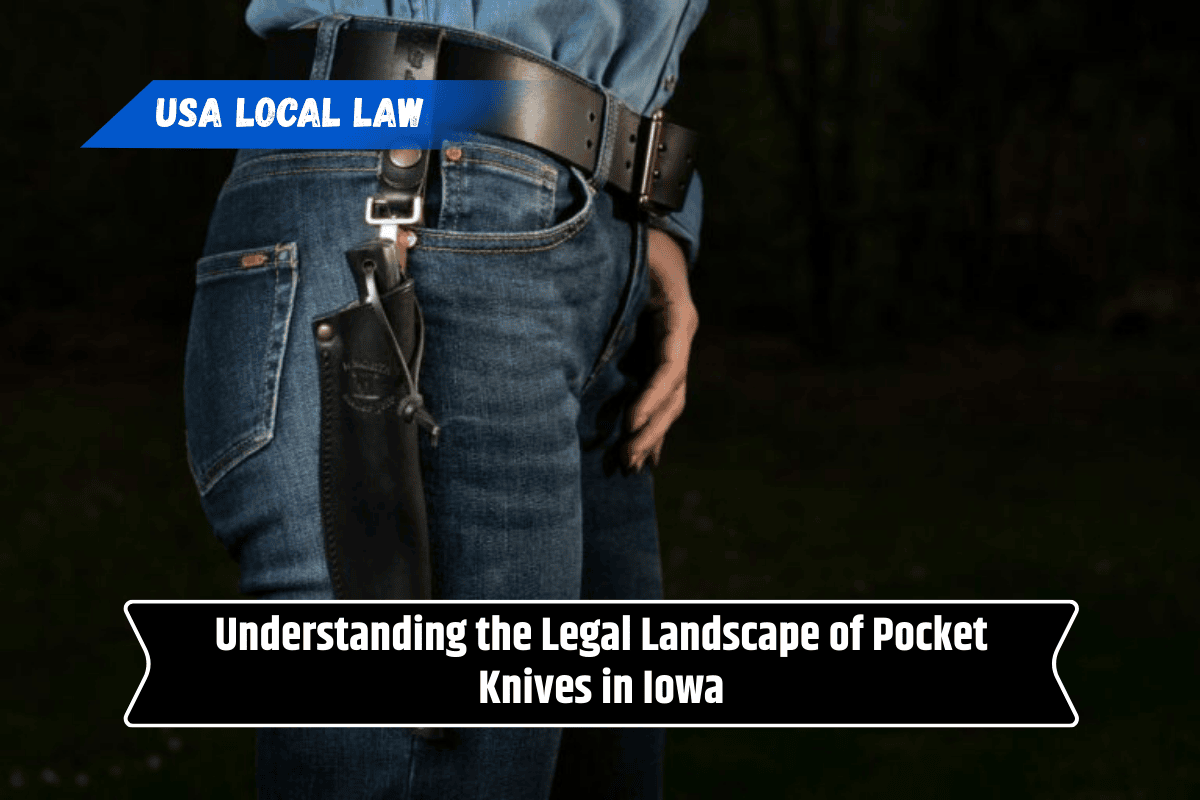Pocket knives are a common everyday tool for many people—useful for outdoor activities, work, or simple daily tasks. But in Iowa, owning or carrying a pocket knife isn’t as simple as just putting one in your pocket and heading out the door.
While pocket knives are generally legal in Iowa, there are important legal rules to follow depending on the knife type, blade length, how it’s carried, and where you take it.
Here’s a simple guide to understanding Iowa’s pocket knife laws so you can stay on the right side of the law.
Are Pocket Knives Legal in Iowa?
Yes, pocket knives are legal in Iowa, but there are rules. The legality mostly depends on:
Blade length
Type of knife
How you carry it (concealed or open)
Where you carry it (school, courthouse, etc.)
Legal Blade Length for Pocket Knives
Iowa doesn’t have a specific state-wide law that limits the blade length for all knives, but when it comes to concealed carry, the size of the blade becomes important.
According to Iowa Code § 724.4, carrying a concealed knife with a blade longer than 5 inches is considered a dangerous weapon, and doing so without proper legal justification can lead to criminal charges.
Types of Pocket Knives and Their Legal Status
| Knife Type | Legal to Own | Legal to Open Carry | Legal to Concealed Carry (Blade ≤ 5″) |
|---|---|---|---|
| Folding pocket knife | Yes | Yes | Yes |
| Fixed-blade knife | Yes | Yes | Yes (if blade is 5” or less) |
| Switchblade (automatic) | Yes (after 2017 law change) | Yes | Yes (if under 5″) |
| Butterfly knife (balisong) | Yes | Yes | Yes (same blade length rules apply) |
| Gravity knife | Yes | Yes | Yes (under blade length rules) |
Note: Knives with blades over 5 inches are classified as dangerous weapons and carrying them concealed could require a valid reason (like work or hunting) or a permit.
Where You Can’t Carry a Knife in Iowa
Even legal knives are banned in certain places. It’s illegal to carry any knife—regardless of blade length—in the following locations:
Schools (including parking lots and buses)
Courthouses and other government buildings
Airport security zones
Private properties with posted signs
Breaking these rules can result in serious consequences, including misdemeanor or felony charges depending on the situation.
Concealed Carry vs. Open Carry in Iowa
Open carry: Legal for most knives, including pocket knives and fixed-blades.
Concealed carry: Legal if the knife is not classified as a dangerous weapon (i.e., blade is 5 inches or less). For larger knives, you must show a lawful reason or face legal risk.
Minors and Knife Laws
There are no clear state-wide restrictions on minors carrying pocket knives in Iowa, but:
Schools often have zero-tolerance policies
Minors caught with knives in prohibited areas can still be disciplined or charged
Parents may also be held responsible if the knife is used irresponsibly
Penalties for Illegal Knife Carry
Violating Iowa knife laws can lead to:
Simple misdemeanor (fine up to $855 and/or 30 days in jail)
Aggravated misdemeanor or felony charges if a weapon is used to threaten or harm
Legal trouble depends on intent, location, and blade size.
Tips to Stay Legal with Pocket Knives in Iowa
Keep the blade under 5 inches if carrying concealed.
Avoid bringing knives to schools, government buildings, or airports.
Don’t use the knife in a threatening or unsafe way.
If you’re unsure, carry your knife openly and visibly.
Respect posted property signs banning weapons.
Pocket knives are mostly legal in Iowa and widely accepted as tools, but the laws around how and where you carry them matter. Blade length, knife type, and location play a major role in what’s considered legal.
If you use your pocket knife responsibly and follow state and local rules, you’ll likely stay out of trouble. But a simple mistake—like carrying a longer blade into the wrong place—can quickly turn into a legal issue. When in doubt, stay safe, stay informed, and carry with care.
